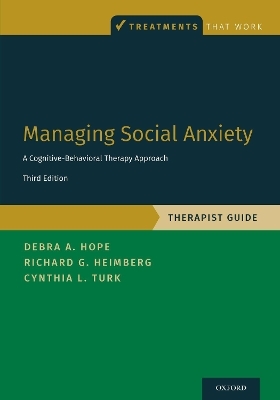
Managing Social Anxiety, Therapist Guide
Oxford University Press Inc (Verlag)
978-0-19-024759-1 (ISBN)
Social anxiety is a common and potentially disabling problem that can occur in situations ranging from dating to conversations to job interviews. Fortunately, three decades of research have shown that most people struggling with social anxiety can benefit from the cognitive-behavioral intervention described in Managing Social Anxiety.
The third edition of this Therapist Guide represents the latest update of the gold-standard psychosocial intervention for social anxiety. The guide provides foundational information on the nature of social anxiety and the empirically supported cognitive-behavioral techniques used to treat it, how best to implement these techniques, and how to deal with challenges that arise during treatment. New to this edition are updated procedures and background reflecting current science and clinical findings, a greater emphasis on a multicultural approach to practice, and more attention to client goals. The step-by-step approach detailed in Managing Social Anxiety is easy for beginning therapists to implement, and offers many practical recommendations to help clients successfully engage with the treatment. More experienced therapists will find useful strategies for challenging cases and expert guidance on fine-tuning their approach.
Debra A. Hope is a professor in the Department of Psychology at the University of Nebraska-Lincoln. She has published over 110 books and papers on topics related to social anxiety, cognitive-behavioral treatment, dissemination of evidence-based treatments and the mental health impacts of stigma on gender and sexual minorities. Professor Hope is Past President of the Association of Behavioral and Cognitive Therapies and past Associate Editor of Clinical Psychology: Science and Practice and Cognitive Therapy and Research. Richard G. Heimberg is the Thaddeus L. Bolton Professor of Psychology at Temple University, where he also directs the Adult Anxiety Clinic. He is well known for his efforts to develop and evaluate models and treatments for social anxiety disorder. He has published 12 books and more than 450 papers on social anxiety, CBT, and related topics, and was recently listed among the top 1% of cited authors in his field according to Thomson Reuters. Dr. Heimberg is Past President of the Association for Behavioral and Cognitive Therapies and of the Society for a Science of Clinical Psychology, and Past Editor of Behavior Therapy. Cynthia L. Turk is a professor in the Psychology Department at Washburn University, where she serves as the department chairperson. She is Past President of the Southwestern Psychological Association. She has over 60 professional publications and over 100 professional presentations, primarily in the areas of social anxiety disorder and generalized anxiety disorder. She teaches graduate courses in psychopathology and psychotherapy techniques and supervises master's students in the Washburn University Psychological Services Clinic where she directs the Anxiety Clinic. Dr. Turk is a licensed psychologist.
Introduction
Chapter 1
Psychoeducation: Background on Social Anxiety and its Treatment
Chapter 2
Psychoeducation: Understanding the Nature of Social Anxiety and How to Manage It
Chapter 3
Psychoeducation: Etiology of Social Anxiety and Beginning to Monitor Progress
Chapter 4
The Fear and Avoidance Hierarchy
Chapter 5
Cognitive Restructuring: Learning about Cognitive Biases and Identifying Automatic Thoughts
Chapter 6
Cognitive Restructuring: Challenging Automatic Thoughts
Chapter 7
Exposure and Cognitive Restructuring: First Exposure
Chapter 8
Exposure and Cognitive Restructuring: Ongoing Exposure
Chapter 9
Additional Tools for Challenging Your Automatic Thoughts
Chapter 10
Exposure and Cognitive Restructuring: Conversation Fears
Chapter 11
Exposure and Cognitive Restructuring: Public Speaking Fears
Chapter 12
Advanced Cognitive Restructuring
Chapter 13
Termination
Appendix A
Assessment of Social Anxiety Disorder
Appendix B
Assessment Measures
| Erscheinungsdatum | 15.11.2019 |
|---|---|
| Reihe/Serie | Treatments That Work |
| Verlagsort | New York |
| Sprache | englisch |
| Maße | 178 x 251 mm |
| Gewicht | 431 g |
| Themenwelt | Geisteswissenschaften ► Psychologie ► Persönlichkeitsstörungen |
| Medizin / Pharmazie ► Medizinische Fachgebiete ► Psychiatrie / Psychotherapie | |
| ISBN-10 | 0-19-024759-2 / 0190247592 |
| ISBN-13 | 978-0-19-024759-1 / 9780190247591 |
| Zustand | Neuware |
| Haben Sie eine Frage zum Produkt? |
aus dem Bereich


